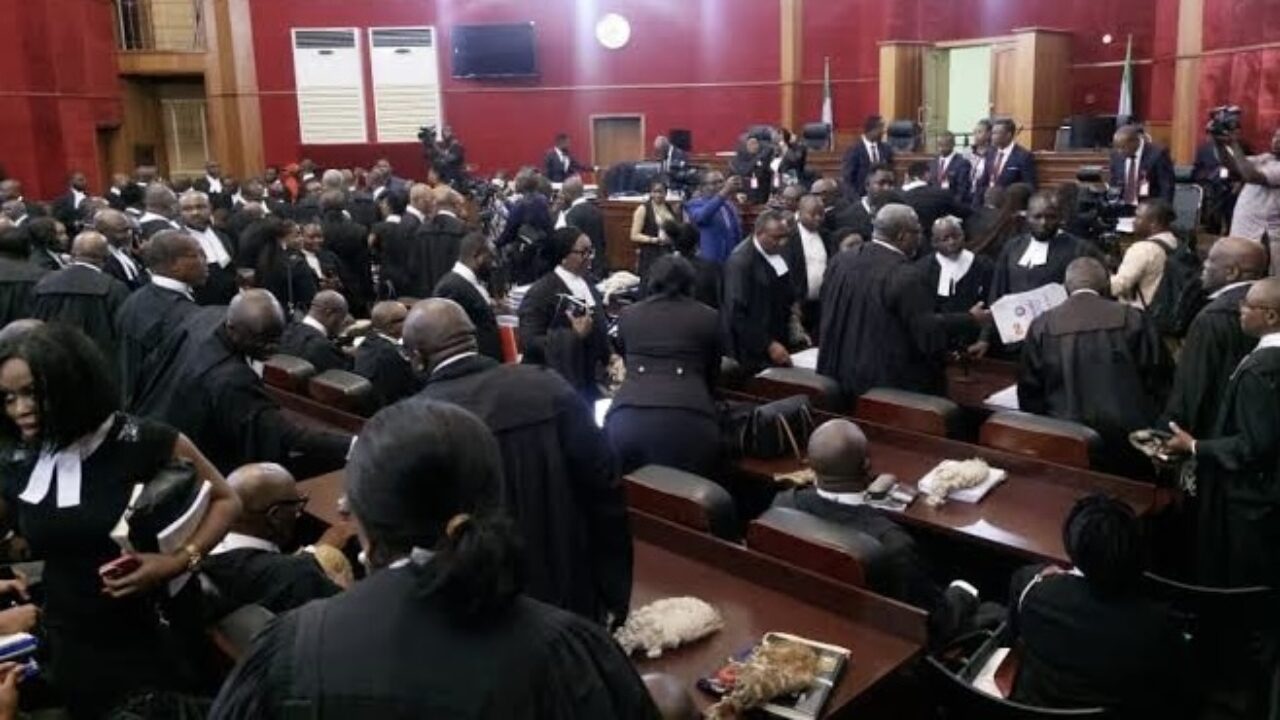The Edo State Governorship Election Petition Tribunal witnessed a dramatic turning point on Thursday, February 13, as the All Progressives Congress (APC) abruptly closed its defense without calling 24 of its listed witnesses.
The sudden decision comes after a series of damning testimonies from APC’s own witnesses, who—under cross-examination—admitted to over-voting and election irregularities, further unraveling the party’s defense of Governor Monday Okpebholo’s contested victory.
APC’s Legal Strategy Crumbles Under Scrutiny
APC had originally planned to present 28 witnesses to counter the Peoples Democratic Party’s (PDP) petition challenging Okpebholo’s election. However, only four witnesses testified before the tribunal, with the majority refusing to take the stand after witnessing their colleagues falter under cross-examination.
The turning point in the hearing came when one APC witness after another conceded to election malpractices, including discrepancies in election results and procedural failures by the Independent National Electoral Commission (INEC).
The most explosive testimony came from Engr. Gabriel Iduseri, also known as Gabros, the APC collation agent for Oredo Local Government Area. When confronted with polling unit results uploaded on INEC’s Result Viewing Portal (IREV), he admitted that the figures did not match those used to declare Okpebholo the winner.
“These results are strange, My Lord. I do not know where they emanated from,” Iduseri stated, sending shockwaves through the courtroom.
READ ALSO: Edo Tribunal: Why We Are Confident Of Victory – PDP Chieftain- Aziegbemi
INEC’s Absence Further Weakens APC’s Case
Adding to APC’s troubles, INEC—despite being the body responsible for conducting the election—failed to present a single witness to defend its declaration of Okpebholo as governor. The electoral body’s silence has been interpreted as an admission that it had no credible response to PDP’s claims of election fraud.
With INEC refusing to back its own election results, APC was left scrambling to salvage its defense. However, its witnesses only deepened the crisis. Among them, Usman Majek admitted to over-voting in Ovia South-West, while Theophilus Afuda, APC’s Esan North East collation agent, reversed his earlier stance and conceded that over-voting had indeed taken place.
He also admitted that INEC failed to record serial numbers of sensitive election materials, a fundamental lapse that compromises electoral integrity.
Tribunal Faces Mounting Evidence of Electoral Fraud
With no defense left and overwhelming evidence presented by PDP, APC’s abrupt decision to close its case signals a major legal defeat. The implications are clear:
APC has failed to challenge PDP’s evidence, which includes BVAS records, Certified True Copies (CTCs) of election results, and IREV data that contradict INEC’s final declaration.
Tribunal precedent dictates that where over-voting is proven, results from those polling units must be canceled.
If fraudulent votes are removed from the final tally, PDP’s candidate, Asue Ighodalo, emerges as the rightful winner.
Legal analysts suggest that APC’s only remaining option is to delay proceedings or seek a technical ruling to avoid outright disqualification. However, with a weakened case and no counter-evidence, Okpebholo’s legal standing appears increasingly untenable.
As the tribunal moves closer to delivering its judgment, all eyes are on the judiciary.
The case has now shifted from a battle of legal arguments to a test of judicial integrity. With the weight of evidence stacked against APC and Okpebholo, legal experts and political observers predict a ruling that could overturn the election results.

 Football7 days ago
Football7 days ago
 Entertainment6 days ago
Entertainment6 days ago
 Football1 week ago
Football1 week ago
 Business5 days ago
Business5 days ago
 Football1 week ago
Football1 week ago
 Football6 days ago
Football6 days ago
 Business6 days ago
Business6 days ago
 Crime7 days ago
Crime7 days ago

